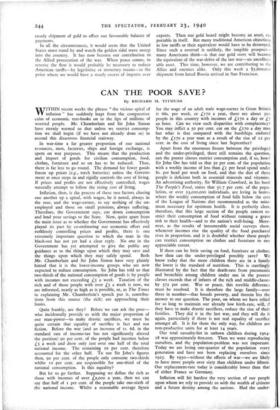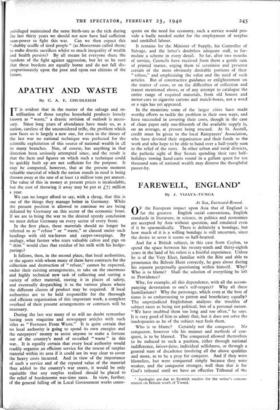CAN THE POOR SAVE ?
By RICHARD M. TITMUSS
WITHIN recent weeks the phrase " the vicious spiral of inflation " has suddenly leapt from the comparative calm of economic text-books on to the lips of millions of worried people. Mr. Chamberlain and Sir John Simon have sternly warned us that unless we restrict consump- tion we shall begin (if we have not already done so) to ascend this disastrous financial stairway.
In war-time a far greater proportion of our national resources, men, factories, ships and foreign exchange, is spent on war purposes. This means that the production and import of goods for civilian consumption, food, clothes, furniture and so on has to be reduced. Thus, there is far less to go round. The demand for fewer goods forces up prices (e.g., torch batteries) unless the Govern- ment at once steps in and rigidly controls the cost of living. If prices and profits are not effectively controlled, wages naturally attempt to follow the rising cost of living.
Inflation, then, is the process of these two factors chasing one another up a spiral, with wages, be it noted, always in the rear, and the wage-earner, to say nothing of the un- employed and those on small pensions, always suffering. Therefore, the Government says, cut down consumption and lend your savings to the State. Now, quite apart from the main issue as to whether the Government has effectively played its part by co-ordinating our economic effort and ruthlessly controlling prices and profits, there is one extremely important question to which the man in the black-out has not yet had a clear reply. No one in the Government has yet attempted to give the public any guidance as to the things upon which they may save and the things upon which they may safely spend. Both Mr. Chamberlain and Sir John Simon have very plainly hinted that it is the lower-income groups who are now expected to reduce consumption. Sir John has told us that two-thirds of the national consumption of goods is by people with incomes not exceeding £5 a week. Taxation of the rich and of those people with over £5 a week is now, we are informed, nearly as high as is possible, or, as The Times in explaining Mr. Chamberlain's speech put it, contribu- tions from this source (the rich) are approaching their limits.
Quite frankly, are they? Before we can ask the poor— who incidentally provide us with the major proportion of our man-power—to make drastic sacrifices, we must be quite certain that equality of sacrifice is fact and not fiction. Before the war (and an increase of Is. 6d. in the standard rate of income-tax has not significantly altered the position) 90 per cent. of the people had incomes below £5 a week and drew only just over one half of the total national income. The remaining to per cent. therefore accounted for the other half. To use Sir John's figures then, 90 per cent. of the people only consume two-thirds whilst to per cent. are responsible for one-third of the national consumption. Is this equality?
But let us go farther. Supposing we define the rich as those with incomes of over £2,000 a year, then we can say that half of 1 per cent. of the people take one-sixth of the national income. Whilst a reasonable average figure for the wage of an adult male wage-earner in Great Britain is 66s. per week, or £170 a year, there are about Soo people in this country with incomes of £170 a day or £7 an hour. Can we view such disparities with complacency? You may inflict a 5o per cent. cut on the £170 a day man but what is that compared with the hardships endured by the £170 a year man as a result of the rise of 12 per cent. in the cost of living since last September?
Apart from the enormous fissure between the privileged and the under-privileged, there still remains the question, can the poorer classes restrict consumption and, if so, how? Sir John Orr has told us that 5o per cent. of the population with a weekly income of less than ir per head spend under 8s. per head per week on food, and that the diet of these people is deficient both in essential minerals and vitamins. An advertising authority, Sir William Crawford, in his book The People's Food, states that 51.7 per cent. of the popu- lation, or over 23,000,000 individuals, are living in -homes where the weekly consumption of food falls below the cost of the League of Nations diet recommended as the mini- mum necessary for optimum health. It is perfectly clear, therefore, that this large section of the people cannot re- strict their consumption of food without running a grave risk to their health—and to the nation's well-being. More- over, as the results of innumerable social surveys show, whenever incomes rise the quality of the food purchased rises in proportion, and it is doubtful whether these people can restrict consumption on clothes and furniture to any appreciable extent.
If there can be little saving on food, furniture or clothes, how then can the under-privileged possibly save? We know today that the more children there are in a family the lower is the standard of nutrition. This is startlingly illustrated by the fact that the death-rate from pneumonia and bronchitis among children under one in the poorest classes exceeds that of infants of the rich and middle-classes by 572 per cent. War or peace, this terrible difference must be resolved. It is therefore the large family—over three in number—that breeds poverty, and therein lies the answer to our question. The poor, on whom we have relied for so long to maintain our already low birth-rate, will, :f they have to make drastic sacrifices, reduce the size of their families. They did it in the last war, and they will do it again, particularly if there is not real equality of sacrifice amongst all. It is for them the only way, for children are non-productive units for at least 14 years.
Our total casualty4ist in unborn children during 1914- 18 was approximately 600,000. Then we were reproducing ourselves, and the population-problem was not important. Today we are losing one-quarter of the population every generation and have not been replacing ourselves since 1925. By I950—without the effects of war—we are likely to have more people over sixty than children under fifteen. Our replacement-rate today is considerably lower than that of either France or Germany.
Inflation will hit hardest the very section of our people upon whom we rely to provide us with the wealth of citizens and a future destiny among the nations. Had the under- privileged maintained the same birth-rate as the rich during the last thirty years we should not now have had sufficient man-power to fight this war. Can we then expect this " shabby scuffle of tired people " (as Masterman called them) to make drastic sacrifices whilst so much inequality of wealth and health persists? By all means let everyone share the burdens of the fight against aggression, but let us be sure that these burdens are equally borne and do not fall dis- proportionately upon the poor and upon our citizens of the future.







































 Previous page
Previous page